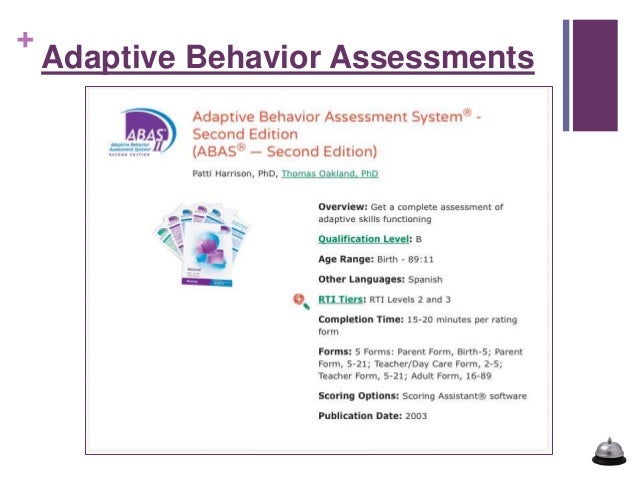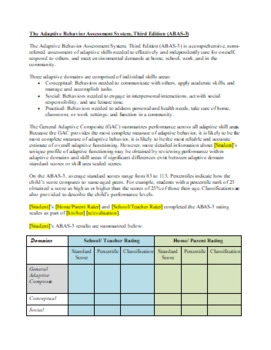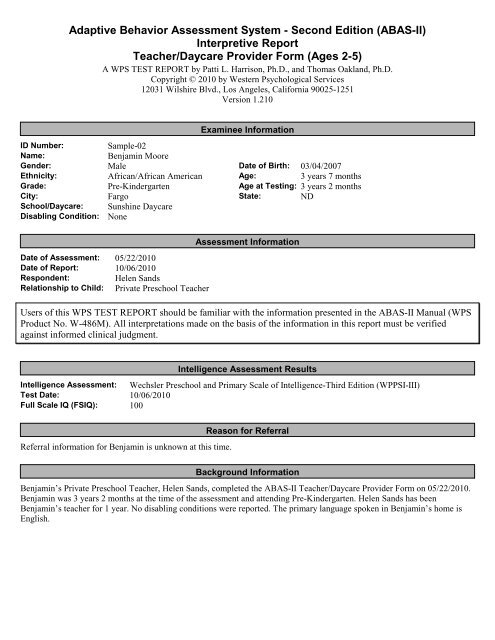Adaptive Behavior Assessment System Third Edition (ABAS-3) gives a complete picture of adaptive skills across the lifespan. It is particularly useful for evaluating those with developmental delays, autism spectrum disorder, intellectual disability, learning disabilities, neuropsychological disorders, and sensory or physical impairments. Jane’s parent, Linda Smith, completed the ABAS–II Parent Form on. Jane was 9 years, 7 months at the time of the assessment and attending 3rd grade. No disabling conditions were reported. The primary language spoken in Jane’s home is English. She has 2 siblings at home. Adaptive Behavior Assessment System-Second Edition. Adaptive Behavior Assessment System -II (ABAS-II) ABAS III Retaining all features that made the second edition the preferred instrument for evaluating adaptive behavior, the ABAS-3 is even easier to administer and score. Comprehensive, convenient, and cost-effective, this behavior rating scale measures daily living. Type of Instrument: Normative-referenced assessment instrument. Comments: The Adaptive Behavior Assessment System-2nd Edition (ABAS-II) is an assessment of an individual's daily living skills, developed along the guidelines of the American Association of Mental Retardation. The Adaptive Behavior Assessment System®-Second Edition (ABAS®-Second Edition) test and Windows software were published in Fall 2003. ABAS-II is primarily a downward extension Birth to 5.6. The product now ranges from 0-89. There are additional forms and the new AAMR composites are included. ABAS II and ABAS II Scoring Assistant are new.
Author: Thomas OaklandPublisher: Academic Press
 ISBN:
ISBN:
 9780080559780
9780080559780 Size: 48.74 MB
Size: 48.74 MB
Format: PDF, Kindle
View: 7345
Abas Ii Scoring Manual Pdf
Get BooksAbas Ii Pdf
Adaptive Behavior Assessment System-II summarizes information on adaptive behavior and skills as well as general issues in adaptive behavior assessment with the goal of promoting sound assessment practice during uses, interpretations, and applications of the Adaptive Behavior Assessment System-II. Adaptive behavior and skills refer to personal qualities associated with the ability to meet one’s personal needs such as communication, self-care, socialization, etc. and those of others. Data from measures of adaptive behavior have been used most commonly in assessment and intervention services for persons with mental retardation. However, the display of adaptive behaviors and skills is relevant to all persons. The Adaptive Behavior Assessment System-II (ABAS-II) provides a comprehensive, norm-referenced assessment of the adaptive behavior and skills of individuals from birth through age 89. The comprehensive natures of the ABAS-II, ease in administration and scoring, and wide age range have resulted in its widespread use for a large number of assessment purposes. The book provides practical information and thus serves as a valuable resource for those who use the ABAS-II. Assists in the functional use of the ABAS-II Provides case studies illustrating use of the ABAS-II in comprehensive assessment and intervention planning Reviews scholarship on adaptive behaviors and skills Describes legal, ethical, and other professional standards and guidelines that apply to the use of the ABAS-II and other measures of adaptive behavior Discusses the use of the ABAS-II with autism, mental retardation; young children and those in elementary and secondary school; as well as incarcerated persons being evaluated for possible mental retardation
Abas Ii Pdf Download
